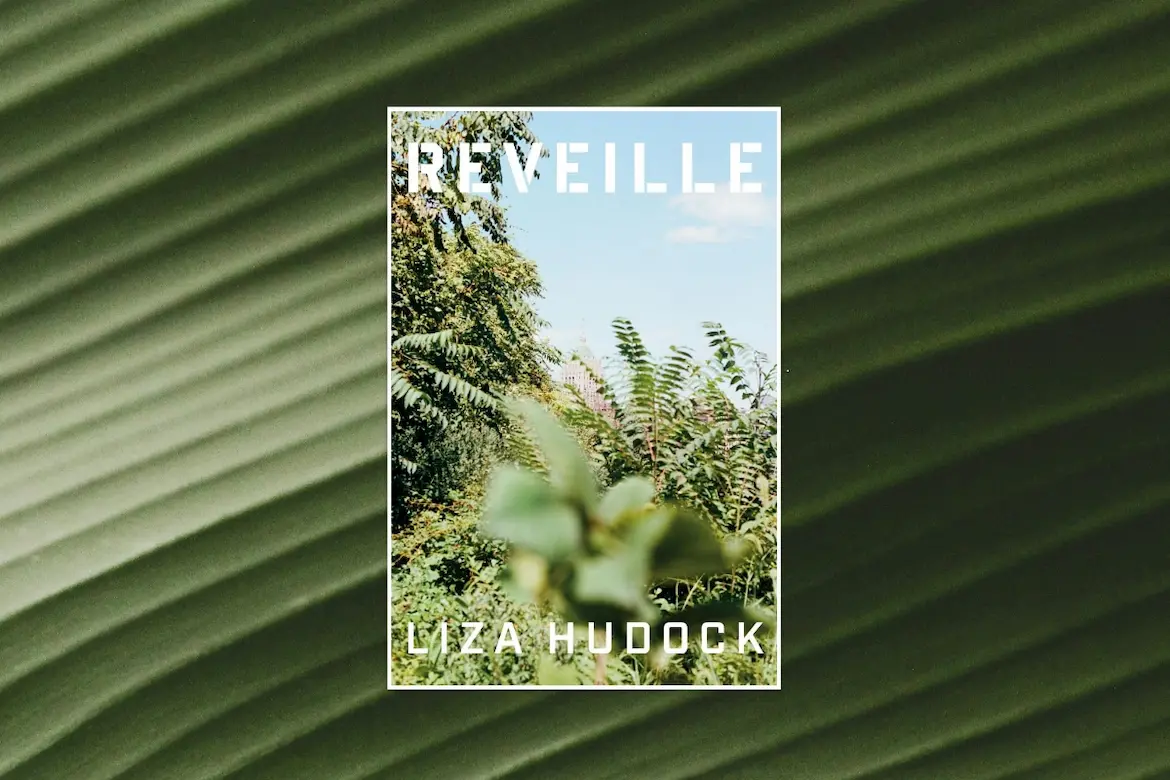You can buy the books we recommend on Bookshop on our list of LitStack Recs.

In This LitStack Review of Reveille by Liza Hudock
A Nub of Clay | “Reveille” by Liza Hudock
Wrestling With Grief
The title of Liza Hudock’s debut collection, Reveille, does double work, referencing both the poet’s military service (U.S. Coast Guard) and a more metaphoric wake up call. Centered on family and loss, these poems detail a sense of duty that clings beyond the grave. With a syntax spare and plain spoken as a morning bugle call, Hudock renders grief every which way as she wrestles it to the ground.
The powerful opening poems launch us into the heat of the moment, beginning with “Boy in a Red Waistcoat,” an Ars Poetica that sets out a warning about disappointed innocence: “How it can harden / you into an artifact / or it can be your / nub of clay.”
“Water and Oil” follows with a domestic scene that evokes a state of disorientation. We’re not sure who the speaker is: “It’s enough / to make you hate your own daughter.” There is a priest that zips away in a yellow Camaro. Atmospheric tension shows up as “clicking of the gas stove / trying to ignite.” Even the lineation resists order: Hudock throws a long line off balance by breaking it at an uneasy place and leaving a short fragment on the following line. And yet, the concrete details anchor the reader. I am compelled to read on.
Setting Scene And Introducing Characters
A speaker cares for a difficult dying mother in working class, rural or industrial mid-America. Religious iconography makes an appearance. An incarcerated brother and a missing father hint of harsh childhood. The speaker is close to Maddie, whose death is contemporaneous to the mother’s. “Pud” plays a stabilizing role.
Animals appear both literally and figuratively: mice that damage a fur coat, a largemouth bass, Medusa’s head of snakes. Death comes down a chimney like a pigeon. The brother finds a hidden stash of money like “an octopus who can find its way out of a jar with the lid screwed shut.”
“Wool Washing” (pg 36), expressed in 39 short lines that flow down the page in the manner of a creek like the one depicted within, is a good example of the many ways Reveille mines bereavement within context of the family background:
I like to wash wool blankets
in a rubber tub, stomping
as if I live on a vineyard,
the detritus of a year
squelching and puffing
between my feet. I remember
my great aunt who crocheted
them, the darkly churning
water of the creek behind
her house, here viscous, here
hissing, streaked with tannins,
slipping forward, doubling
back on itself.
The poem goes on to talk about cows on the opposite bank, “kicking / plumes of snow to form / a bony necklace around / their bale of hay:
This must be decorum. This
is what I lack. Some weight
around my neck and a cow’s
habit of wearing it.
Conversational Voice
A group of my favorite poems tucked into the middle of Reveille features an easy conversational tone that belies the impact of the topic at hand. In “Crematory” (pg 33), a prose poem of notable restraint, the gruesome reality of cremating the mother’s corpse (“smaller than I remember, also narrower”) is delayed by a conversation with the man who works the furnace:
“Coveralls and welding gloves. He seems like a nice guy. He tells me I must try the water from their fountain, that it’s triple-filtered, the cleanest in the city, possibly the state. He insists two times. I suspect he’s setting up a joke, that the punchline has to do with ash and carbon filters, but I take a paper cone from the stack beside the fountain and he is right, their water is good.”
In “Whitman” (pg 34), the speaker addresses the father of free verse with irony and wit: “The week of Maddie’s memorial, I picked one of your poems to share in the group chat—it seemed like someone should read something at a memorial—and your poem came back with edits. A girl selling turkey legs at Disney thinks you use too many adverbs. A woman weaving circular blankets in rural Ohio finds your America too butch.”


Moving Toward Epiphany
Toward the final third of the book, the poems shift tonally to become more sober and reflective, and the material begins a turn toward epiphany. “Froggy Embrace” (pg 48), addresses the pain of not fully expressing oneself before death of a loved one. In “A Clear Immutable Truth” (pg 61), guilt slowly simmers into something like forgiveness:
When I don’t want to think
alone, I make a soup.
I make a soup and listen
to it simmer like a mind
with all the answers.
I add a carrot, a bay leaf,
a rib bone, fleck of star
anise, a single fennel
seed, and then consign
my questions to the soup.
My ingredients bob
along the surface
and I interpret the ways
they roll as signs.
I can live off soup forever,
as long as certain subjects
are not broached. One day,
I peered into the pot
and asked it straight up:
Am I evil? A tiny bubble
flicked my cheek
with scalding oil—you
are nerve and flesh.
Whether writing in lines of three or four beats, or stretching a thought longer across the page, Hudock’s cadence is musical. She has a light touch and often a subtle humor, even when rendering a tough moment. What better way to make loss a pleasurable read?
In the title poem, “Reveille” (pg 68), the speaker talks directly to the dead. I’m reminded of a class I took once during which the poet Marie Howe shared how she had revised one of her own poems so as to not tell her dead brother something he would already have known. In other words, the conversation became more authentic, rather than a story telling device intended more to inform the reader than the brother. Hudock does a little of both here. Her speaker begins with a redundant statement, but then proceeds into what feels like a real and present conversation:
You died four months ago and the sparrows
still remember you. All I have to dois show them the copper pot
you used to fill with waterto fling at their bush for their
manic chirping to cease.Was the silence familiar
when it first closed over your ears?
Of course, a conversation with the dead is of benefit only for the living. Later in the poem, the speaker expresses her appreciation for a calming interaction:
Once, you texted me
a line of poetry.It wasn’t one of the big ones,
it was the kind of line I like.The record of a life:
and I have sat and watched the trees.


Location, Location, Location
We always know where we are in Hudock’s poems. “Tansy” (pg 66) is an example of a two-part strategy, where first we’re given a description of nature to ground us in a physical place before entering an interior reflection:
A bog full of it and no one else
around. Star-cluster blooms joy-
yellow, each blossom a glowing dome
like E.T.’s finger. Perhaps being a plant,
tansy can indicate home without
attachment, unlike E.T., unlike me……
… I dreamed Maddie was a ball of light.
In a light-ball’s speechless manner
she expressed herself to me.
The dream got silly when the other
burning balls conveyed that they
were cats and dogs. Still, it was a nice
dream. Full of love.
Hudock uses this outside/inside approach in the final poem of the book, “Storm” (pg 75), a beautifully lyric resolution that opens with “Chartreuse liquor-tinted air / could mean tornado” then moves to “In the kitchen, a ladybug / casts for a tear in the screen / door.” The final lines combine both:
… A fleecy
cloud asserts eternal
infancy against a darkening sky,
gathers in and pulls apart,
burgeons and frays, articulates
in its meekness the very question
that the storm draws out of you
like scent from mud:…
can you love me? …
The speaker addresses herself this time with the line, “can you love me?” This is the ultimate forgiveness the collection has been reaching for. Reveille is thoroughly satisfying, obsessive in its gaze. Hudock has introduced herself in this debut as a poet who never takes the easy way out.
~ Karen Hildebrand
About Liza Hudock

Liza Hudock was born in Detroit, Michigan. After many moves, Liza resides there now. From 2017-2021, Liza was a Boatswain’s Mate in the U.S. Coast Guard. In 2024, Liza graduated from the Program for Writers at Warren Wilson College. Reveille is Liza Hudock’s first collection of poems.
You can connect with Liza Hudock on their website, and on Instagram.


Other Poetry Titles LitStack Recommends

Other LitStack Resources
Be sure and look at our other LitStack Reviews for recommendations on books you should read, including reviews by Lewis Buzbee, Lauren Alwan, Allie Coker, Rylie Fong, and Sharon Browning.

Comment Using Emote
You can find and buy the books we recommend at the LitStack Bookshop on our list of LitStack Recs.

As a Bookshop, Malaprop’s, BAM, Barnes & Noble, Audiobooks.com, Amazon, and Envato affiliate, LitStack may earn a commission at no cost to you when you purchase products through our affiliate links.






